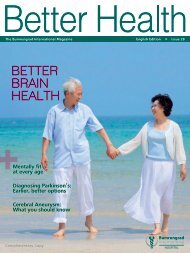Better Health 25 Eng
The magazine for patients and friends of Bumrungrad International Hospital, Thailand.
The magazine for patients and friends of Bumrungrad International Hospital, Thailand.
- TAGS
- bumrungrad
- hospital
- thailand
You also want an ePaper? Increase the reach of your titles
YUMPU automatically turns print PDFs into web optimized ePapers that Google loves.
AGING BRAIN<br />
Normal memory lapse, or a sign<br />
of something serious?<br />
Every senior forgets things now and then. But when is a memory<br />
problem a sign of something more serious such as dementia or<br />
Alzheimer’s disease?<br />
Nothing escapes the aging process, the brain included. <br />
The brain’s normal aging process means the older <br />
we get, the more memory lapses we experience. We<br />
can also expect the brain’s speed and sharpness to continue<br />
their gradual, normal decline. But forgetfulness that affects<br />
a senior’s daily activities may be a sign of the more serious<br />
medical problem known as dementia. <br />
According to Dr. Ketchai Suavansri, a cognitive and<br />
behavioral neurologist at Bumrungrad with many years’<br />
experience helping patients with dementia and other<br />
cognitive impairments, dementia poses a greater risk the<br />
older we are: After age 65, dementia’s rate of prevalence is<br />
about eight percent; after age 75, the rate nearly doubles<br />
(to 15%); after age 90, the rate is nearly 50 percent. <br />
<br />
Understanding dementia <br />
Dementia is the medical term for a collection of disorders<br />
affecting brain function which have certain symptoms in<br />
common. People with dementia experience brain impairment<br />
which interferes significantly with their daily lives and their<br />
socialization. “Dementia itself is not a disease,” Dr. Ketchai<br />
explains. “It’s the result of other diseases affecting the areas<br />
of the brain that control various bodily functions.” <br />
There are many disorders known to cause dementia.<br />
“While about 80 percent of the disorders cause permanent<br />
loss of brain function,” notes Dr. Ketchai, “early intervention<br />
can slow the progression and help dementia patients<br />
maintain a good life quality. The progression can be reversed<br />
for about 20 percent of patients, if the specific disease causing<br />
the dementia is identified and treatment begins earlier.” <br />
Degenerative brain-cell diseases, such as Alzheimer’s<br />
disease, cause progressive, irreversible damage to the<br />
brain. So-called reversible dementia, also known as<br />
secondary dementia, is caused by other treatable<br />
disorders, such as brain tumors, thyroid diseases, vitamin<br />
B12 deficiency or as a side effect from taking certain<br />
medications.<br />
<br />
Diagnosing dementia <br />
Since dementia has a number of possible causes,<br />
diagnosing it properly is a complex process requiring<br />
specialized training and expertise. “Even though memory<br />
loss is a common early-stage symptom of dementia, memory<br />
loss by itself isn’t enough to confirm a diagnosis of dementia,”<br />
Dr. Ketchai explains. “Dementia is only diagnosed after<br />
impairment is confirmed for at least two brain functions –<br />
usually memory plus something else such as language or<br />
perception impairment. Diagnosis also requires that the<br />
symptoms be ongoing for at least six months and are<br />
affecting daily activities.” <br />
To diagnose dementia, the doctor typically begins with<br />
a physical examination and a review of the patient’s health<br />
history. Caregivers and family members may be consulted,<br />
as early-stage dementia patients may not be aware of their<br />
symptoms. Blood testing may also be carried out to rule out <br />
15
















